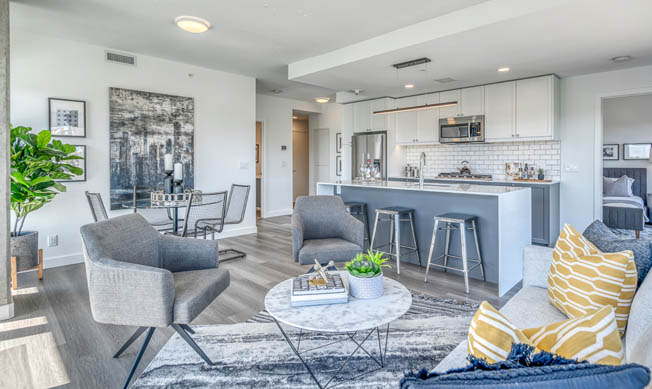Post Move-In
Features & Finishes
Interior Finishes
Interior Finishes
It’s important to understand the many features and finishes in your home, their purpose and how best to care for them.
Countertops

Quartz countertops
Quartz countertops are an engineered surface made from one of nature’s hardest minerals. Quartz is combined with numerous polymers and pigments to create a natural stone look with durability that is far superior to any marble or granite surface. Quartz’s hard, nonporous surface typically makes it easy to clean. In most cases, a little dish soap (non-coloured, dye-free soap) and water is all you need to maintain its lustre.
Granite countertops
Granite and marble are natural stone products, highly regarded for their beauty. Being a product of nature, no two pieces are alike and can vary in tone, shade, veining, contain fissures and indents that all can vary from piece to piece. Impact resistance also varies, and marble particularly can be chipped or cracked easily if misused. Marble and granite are porous stone and may stain, dull and/or scratch upon abrasive contact.
Do not use any harsh or abrasive cleaning products such as Windex®, vinegar, lemon, lime, or anything with ammonia or bleach to clean marble or granite. A little non-coloured (no dye) dish soap and water is the best way to clean this material. You can also refer to the manufacturer’s recommendations for the best practices to take care of this beautiful feature of your home.
Flooring
Laminate flooring can be durable and beautiful, with careful maintenance:
- Sweep or vacuum your floor often to remove loose dirt and grit before it scratches the surface of the floor. Do not clean your laminate floor with water or with a mixture of wax or cleaner such as Murphy® Oil Soap; these solutions can dull the finish and permanently damage the floor
- Wipe up spills before they are absorbed into the wood or become sticky. Spilled liquids or water from cleaning can be easily absorbed into laminate flooring boards and will ruin the finish and integrity of the flooring
- Use products made or suggested by the flooring manufacturer for cleaning and maintaining your laminate floor; most retailers of hardwood flooring stock the appropriate floor care products.
- Use floor protectors on the feet of furniture to avoid scratches
- When moving furniture or appliances, slip a blanket or piece of carpet face down under each foot and slide the furniture carefully
- All laminate floors are subject to indentation. Rolling wheeled furniture or appliances over the floor will dent the boards
We recommend you do not use rubber backed floor mats or area rugs, as they can stick and thereby damage the finished surface of laminate flooring.
Engineered hardwood flooring has a similar composition to laminate flooring, however, instead of a printed vinyl surface there is a thin veneer of real wood. No two pieces of engineered hardwood will have the same appearance, and the finished look is like a real hardwood floor. Engineered hardwood flooring should be maintained using the same steps as laminate flooring, however, because there is only a thin veneer of wood on the top layer, engineered hardwood typically has less resistance to impact, abrasion, or pressure than laminate flooring.
Ceramic and porcelain tiles are specified throughout your home as flooring and wall tiles in your bathrooms, backsplash tiles in your kitchen, and in some homes there are flooring tiles in the laundry room or closet. Ceramic and porcelain tiles are highly durable, stain and scratch resistant and easy to clean, although they can be chipped or cracked if struck with a blunt object.
Marble tiles and countertops are a delicate natural stone, and no two tiles will be alike and likely showcase veins and in some cases, natural fissures that add uniqueness and interest. Marble flooring and wall tiles require a lot of attention to maintain their appearance as they can be easily scratched, stained, chipped, or cracked without proper care. Marble flooring and wall tiles should be annually sealed to protect the stone from stains, and gradual dulling of the polished finish. If marble flooring tiles have been specified, it is also recommended that they be professionally polished and sealed regularly.
Do not use harsh or abrasive cleaning products such as Windex®, vinegar, lemon, lime, or anything with ammonia or bleach to clean marble tiles. Non-coloured dish soap and water can be used for regular cleaning.
Walls and Cabinetry
Laminate cabinetry
All kitchen and bathroom cabinetry is composed of dense fibreboard with a printed laminate surface. Cabinetry can be easily cleaned with a damp cloth and mild detergent or multi-purpose cleaner. Kitchen utensils can scratch cabinetry surfaces easily, but scratches are also easy to repair with a colour touch up kit available from most hardware stores.
Painted/lacquer cabinetry (upgrade)
Painted/lacquer finish cabinetry is a premium finish that requires extra care with regular use. It is important not to use cleaning solutions or products that could damage or dull the painted finish. Use a damp paper towel with diluted vinegar or all-purpose cleaner to clean the surface, and quickly dry with paper towel. Chipped or scratched painted cabinetry is extremely difficult to repair.
Wall and ceiling paint
All interior paints are low VOC (Volatile Organic Compound) latex paints, selected for their high quality and health benefits. Walls that become dirty can be gently washed with a little bit of mild detergent and water, but too much scrubbing will result in the pain being removed.
Finishing and trim carpentry
Interior doors, door casings, and baseboards are coated with semi-gloss paint, making marks and scuffs easy to clean with a damp cloth and mild detergent.

We're here to help

Your Customer Experience Coordinator can provide any answers or connect you with the right person to address any questions - during regular business hours.





